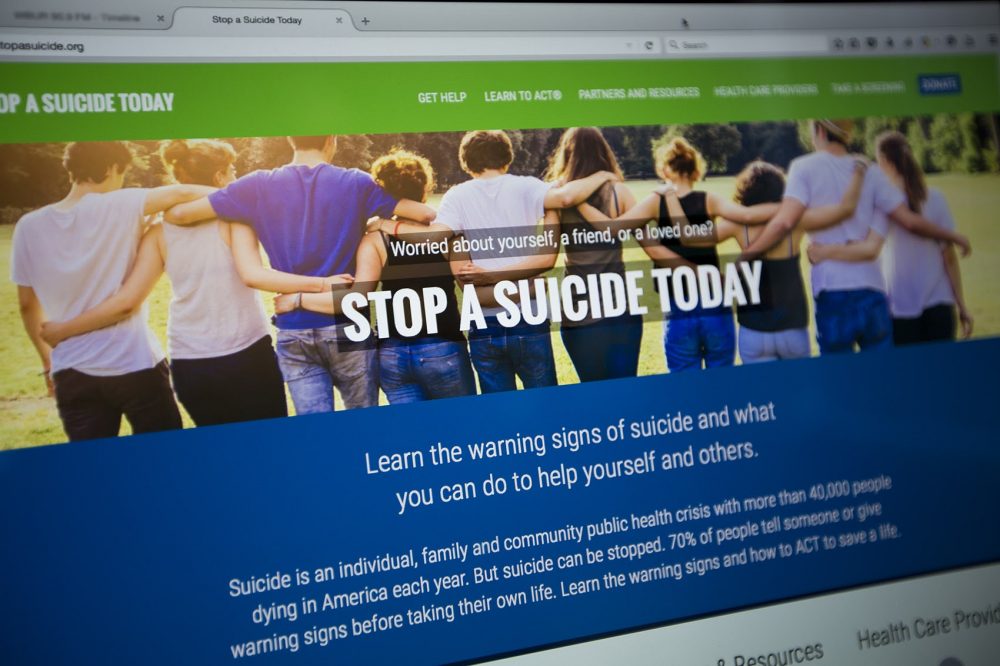Advertisement
New Website Launched By Mass. Organization Teaches How To 'Stop A Suicide Today'
Resume
A Massachusetts-based organization that helps people get screened for depression has created a new tool to help in the fight against suicide. It's a website designed to teach people how to intervene when someone they know might be considering suicide.
The website has a bold name and big banner when it opens: "Stop A Suicide Today."
"When someone talks about suicide or shows signs of despair, hopelessness, giving up, that communication should be taken seriously," says Dr. Douglas Jacobs, medial director and founder of the Wellesley-based nonprofit Screening for Mental Health, which developed the site. "Immediate intervention should occur."
The organization is formally launching the site Thursday, which is National Depression Screening Day. Jacobs, who's a McLean Hospital and Harvard Medical School psychiatrist, first spearheaded the screening day 25 years ago. Now about 500,000 people a year get screened for depression, bipolar disorder, anxiety and addiction through the organization's website.
A Sense Of Urgency
The Stop A Suicide Today site is intended to give people a sense of urgency — to know they can and should intervene when they're concerned a friend or family member might be suicidal, and treat it as a medical emergency — just as if the loved one were having a heart attack.
In 70 percent of cases, a suicidal person makes actual statements indicating what he or she is thinking — sometimes obvious, sometimes more subtle, according to Jacobs.
The statements might be things like, "I won't be around to deal with that," or, "I don't think I'm of any use to anyone," or, "I don't see how I can get by this trauma that I've just experienced," Jacobs says.
He and other mental health professionals say it's critical to ask the question, "Are you considering killing yourself?"
Unlike most websites that discuss suicide warning signs and statistics, the Stop A Suicide Today site simply and clearly outlines how to initiate a dialogue with the person who may be suicidal.
It's based on the acronym ACT — for Acknowledge, Care, Treatment.
"Listen to what they're saying and then acknowledge to them that they seem really, really upset; they seem really hopeless, or they seem despairing, and that it's an awful way to feel," Jacobs explains. "And then to show that you care and say, 'I'm concerned about you. I think there are things we can do to help you.' "
The website then gives information on how to get the person treatment. Offer to call a mental health professional or go with the person to an emergency room. You can call the National Suicide Prevention Lifeline for guidance, especially if the person is resisting.
Together In The 'Darkness'
Jeff House, 53, of Plymouth, says he's sure such a conversation would have helped him. He says no one knew how to talk about suicide or intervene when he was a teenager. The stigma was so high. He attempted suicide when he was 16.
"There were a couple people that I told that I was thinking about suicide. They were very young, as I was, and I scared the heck out of them. And they basically ran away," House recalls.
He and Jacobs point out asking the question, "Are you thinking about suicide?" will not give someone the idea or make the person do it. Advocates say for most people, it's a relief to to be asked and have their feelings validated. And, they stress, the worst thing you can say is, "Don't talk that way," or, "Snap out of it," or "Why don't you go do something fun? You'll feel better."
"Having someone come down in the hole with you and say, 'Here. We're here together in this whole darkness,' that's the connections that help," House reflects.
The Centers for Disease Control recently reported the national suicide rate had increased 24 percent in 15 years.
More than 42,000 people died by suicide in the U.S. in 2014.
Dr. Jacobs says he hopes more people will learn how to have the conversation that can help reverse that trend.
Resources: You can reach the National Suicide Prevention Lifeline at 1-800-273-TALK (8255) and the Samaritans Statewide Hotline at 1-877-870-HOPE (4673).
This segment aired on October 6, 2016.
